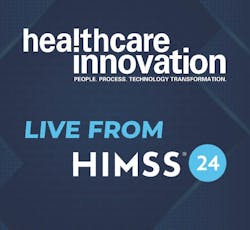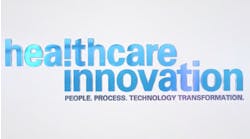Artificial intelligence (AI) is clearly dominating conversations at HIMSS24, the annual conference of the Healthcare Information & Management Systems Society, so much so that Tuesday morning’s opening keynote speaker made it a centerpiece of his focus. On Tuesday, March 12, Robert C. Garrett, CEO of Hackensack Meridian Health, an 18-hospital health system based in Edison, N.J., told a capacity audience gathered in the 6,000-seat Valencia Ballroom in the Orange County Convention Center in Orlando that “Harnessing AI will be one of the defining tasks, I believe, of the 21st century. It may help us cure cancer or extend life. In healthcare today,” he added, “we need radical transformation; we must build the health system of the future, where people have seamless connections to care, a better approach to health and wellness, and a better chance at their best lives. We [need] a revolutionary approach.”
Indeed, Garrett noted, “Earlier this year, I was at the World Economic Forum in Davos. I had the honor of chairing the healthcare forum. It truly was a great meeting. Leaders from across the globe. We had everyone from Zelensky to Sam Walton, speaking. We zeroed in on four global priorities.” And the first global priority agreed on was improving access to healthcare. And, per that, he said, “AI can help us improve people’s access to care.” AI can support innovation in the three other top priorities, too, he noted. In terms of the second priority, he said, AI can improve outcomes and value: “When I think about what AI can do in terms of predicting the onset of disease, AI can make healthcare more efficient and affordable, and that is creating real value.” Similarly, in terms of the third priority, he said, “There’s no question in my mind that AI can help to drive greater health equity, in terms of who’s at risk of one or more social determinants of health.”
And in terms of the fourth priority, climate change and the environment, Garrett said that “There’s no doubt in my mind that AI can help us identify major events around climate, and address climate change. Those four priorities… It’s clear to me that AI technology can help to address all four. We may detect disease earlier, develop drugs faster, prevent burnout, even mitigate climate change. Between 2030 and 2050, climate change is expected to cause an additional 250,000 deaths a year through issues like asthma; and one in four people are now living in drought conditions,” he noted. But, even facing all these issues, he emphasized, the potential for AI to help change the landscape in a positive way, is absolutely real.
After referencing a number of advances taking place right now at Hackensack Meridian, Garrett said that, “On this journey, we must always remember that humans are the heart of healthcare; technology cannot replace the human touch. And we can never forget our fundamental goal: enhancing the lives of people.”
Garrett then sat down for some minutes and dialogued with HIMSS president and CEO Hal Wolf, and Matt Renner, president, North America & Global Startups, Google Cloud.
Wolf turned to Renner and asked him, “Matt, where ais the AI journey headed?”
“It’s been an amazing year; the rise of generative AI has given a lot of focus” to the industry, Renner responded. “But the fact is that AI has been around for decades. But folks went out and did hundreds of thousands of points of proof of concept.” What the industry is seeing now, he continued, is “a successful business use case” around productivity. “Productivity seems to be a key word. For example, we’ve been working with HCA Healthcare on nurse handoffs. There are 20,000 handoffs happening every day between nurses” in that health system, and until recently, they often took up to an hour to complete. With the support of a generative AI solution, he noted, that period of time has been drawn down to minutes.
Garrett noted that it is that kind of solution that will attract a great deal of attention, given that “Surveys are showing that one out of three nurses and one out of five physicians are considering leaving clinical care. They went to nursing school and medical school to be with patients, not to work on EHRs”—electronic health records. Wolf agreed that impacts on workforce could potentially be “huge.”
Meanwhile, Garrett emphasized, “We don’t want to stifle innovation, but we want to make sure as innovators are proposing solutions, that we have consistency of data.”
Per that, Renner said, “We’re intensely focused on ensuring privacy and security. One-third of Internet traffic runs through Google daily. So having security in place is incredibly important.” Speaking to the audience, he said, “Number one, make sure you have your strategy set relative to security. You have to be constantly refreshing your (parameters). Make sure that security and privacy are big parts of your strategy, and for all your members.”
“Where do you decide where to focus your AI models?” Wolf asked Garrett. “I tie it back to mission: our mission is to transform healthcare,” Garrett responded. “I look at the innovation going on, and to focus AI on the areas aligned with our strategic priorities. Improving access to care; also to improve outcomes and focus on prevention. We mentioned productivity; certainly, that’s a big area where AI can play a significant role. And to make healthcare more affordable. And partnerships: we’re proud to be a partner with Google as well. And we really need great partners to help us design platforms. I thank you for your partnership, Matt We have a sandbox approach with companies like Goole, like H2O. To help us focus and roll out AI in a safe and responsible manner.”


